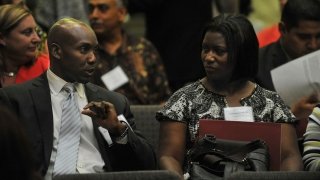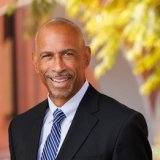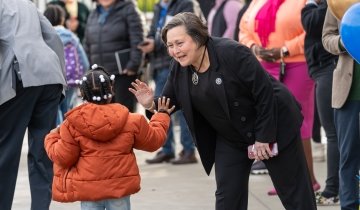In these hyper-polarized times, it can be difficult for educational leaders to deliver nuanced solutions. In addition to political pressure from school boards and educational institutions, cable news and social media have created a culture of shouting matches that thrives on reductive ideas. So how can superintendents and other leaders across K–12 and higher education ensure that they appropriately address the depth of a challenge? Invite more civil debate.
In the recent online panel discussion, A search for common ground: Conversations about the toughest questions in K–12 education, USC Rossier Dean Pedro Noguera and Rick Hess of the American Enterprise Institute, discussed the value of disagreement in education policymaking.
Noguera and Hess represent opposing views on many issues in education, and committed to the experiment of collaborating on a book based on the question of whether or not they could indeed find common ground. “Exchanges like the ones between Rick Hess and I are important because they make it possible to acknowledge the complexity of the challenges facing public education without demonizing those we disagree with,” says Noguera.
Hess acknowledged that their experiment may not be scalable for national leaders, but suggested that it could work for institutional and district leaders. Here are some key takeaways from their conversation.
Embrace pragmatism
When school superintendents “are trying to address a complex issue, they don’t need ideology,” noted Noguera. Educational leaders are passionate about their work, and likely chose their career based personal beliefs. However, when dealing with multiple stakeholders with competing interests, while trying to ensure the best outcomes for students and schools, it’s more useful to focus on solutions. That’s not to say leaders should abandon their core principles. Rather, it’s important to find opportunities to work with those who disagree with them.
Be realistic about the challenge
There is no silver bullet to solving complex problems in education. From testing to charter schools, the issues are more nuanced than the loudest voices in media would suggest. It’s crucial then for educational leaders to remain open-minded, and collaborate in good faith with others who hold different perspectives. Additionally, using research and data to make evidence-based decisions helps avoid the pitfalls of following a supposed template for success.
Have honest conversations
The ability to have open and honest dialogue is essential to leadership—and is more difficult than it may seem. Honesty requires people to confront truths that they would rather avoid, or engage in perspectives that are easier to process when reduced or oversimplified.
“Conversations only get courageous when we talk across our comfort level,” said Hess. Courageous conversations force people to question their assumptions on an issue, assumptions that may be reinforced by the feedback loop of like-minded colleagues.
Reject intellectual laziness
Typically, schools of education advocate for an approach to education that facilitates important goals such as equality and justice, said Noguera. However, “in the interest of seeming like we’re on the right side [of those goals], we don’t want to acknowledge the complexity” of a problem.
This equates to intellectual laziness, as it discourages graduate students from exploring ideas that may seem unpopular or outside the status quo. There are real-world implications as well. Students who aren’t trained to consider other perspectives may struggle to engage in difficult-but-effective collaborations with others in their careers.





